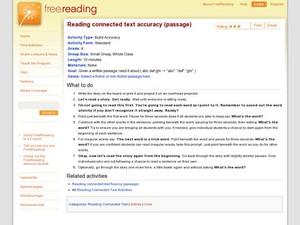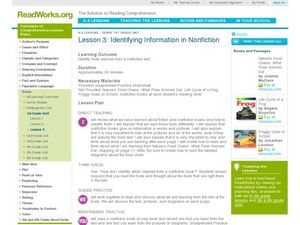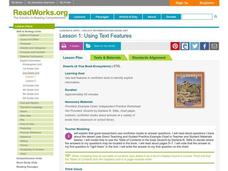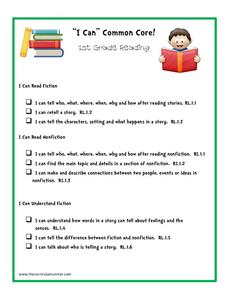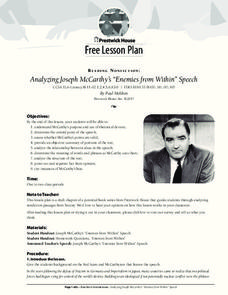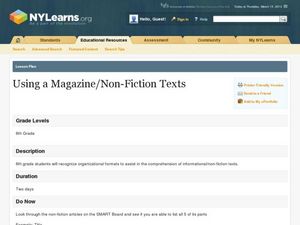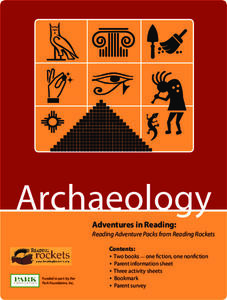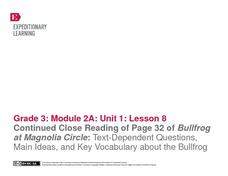Curated OER
Teach Text Features & Read Nonfiction
Elementary schoolers examine the components of reading nonfiction. They use think-alouds to help them complete reading the selected sections. They also identify text features as they read.
Really Good Stuff
Nonfiction Text Features Poster Set
Identifying nonfiction text features is a skill students can take to any subject. A packet of posters demonstrate different text features that learners would encounter in a textbook or informational article, encouraging pupils to think...
Curated OER
Locate Key Information in Nonfiction Text
Interpret nonfiction text with your class. Readers use key information found in nonfiction text to answer questions and problem solve. They utilize the chapter headings, diagrams, glossary, maps, and captions as well as the table of...
Curated OER
Identifying Features of Nonfiction Text
Learners explore nonfiction text. They identify the cover, title page, and table of contents of a nonfiction book. Pupils work in groups to create a chapter for a nonfiction class book about heroes.
Scholastic
Comprehension During Independent Reading
Ideal for a language arts class, literary unit, or independent reading assignment, a set of reading worksheets address a wide array of skills. From poetic elements to nonfiction text features, you can surely find a valuable resource in...
Curated OER
Reading Connected Text Accuracy (Passage)
Use some of these 80-word passages to practice reading fluency with your beginners. Project the text so all learners can see it, pointing to each word as scholars recite them one at a time. Warn readers of irregularly spelled words by...
Curated OER
Identifying Information in Nonfiction
Second graders investigate information in non-fiction texts. They review the features of a non-fiction text and read the book Nature's Food Chains: What Polar Animals Eat. Pupils discuss the text features and write down one fact they...
Curated OER
Characteristics of Nonfiction
The second lesson in a series from ReadWorks.org, this lesson continues to explore the difference between fiction and nonfiction texts. The lesson opens with the teacher reviewing a class Venn diagram started in the last lesson....
Curated OER
Reading Comprehension: Guinness Book of World Records
If your learners are curious about human achievement, superlatives, or esoteric trivia, the Guinness Book of Records is a way to tap into instrinsic motivation and relevance. Here's an informational reading that will grab their attention...
Curated OER
Using Text Features
Investigate a "table of contents" with your young scholars! They read the table of contents in Deserts by Darlene R. Stille and predict where the answers to specific questions might be found. Learners complete a worksheet in which they...
Polk Bros Foundation
Comprehensive Nonfiction Reading Questions
Analyze any nonfiction text with the set of questions on this sheet. Class members practice inferring by noting the main idea and purpose of a passage. They also analyze an opinion in the passage and write a brief summary. See the...
Curated OER
“I Can” Common Core! 1st Grade Reading
I can read and understand fiction and nonfiction texts! Here is a great checklist that highlights 19 first grade Common Core reading standards. The resource is three pages long. Pages one and two focus on comprehension for fiction and...
Fluence Learning
Writing About Informational Text: Music and the Brain
Even if you've never picked up a musical instrument, chances are that music has directly impacted your mental and emotional development. Sixth graders engage in a reading activity in which they read two articles on the impact of music on...
National Council of Teachers of English
Timelines and Texts: Motivating Students to Read Nonfiction
With the emphasis on incorporating more nonfiction in language arts classes the question arises about how to design activities that motivate kids to engage with informational text. How about an assignment that asks class members to...
Prestwick House
Reading Nonfiction: Analyzing Joseph McCarthy's "Enemies from Within" Speech
Looking for a lesson that teaches class members how to analyze nonfiction? Use Joseph McCarthy's famous "Enemies from Within" speech as a instructional text. Worksheet questions direct readers' attention to the many historical...
EngageNY
Mid-Unit Assessment: Close Reading of Bullfrog at Magnolia Circle: Bullfrog Life Cycle
The sixth lesson plan in this Bullfrog at Magnolia Circle unit assesses your third graders' ability to read and understand informational text. The included assessment asks learners to take notes about the main idea and supporting...
EngageNY
Close Reading of Bullfrog at Magnolia Circle: Main Ideas about the Bullfrog
As your class reaches the end of the book Bullfrog at Magnolia Circle, the seventh lesson in this literary unit helps third graders transition from reading narrative to expository writing. Scholars develop their note-taking skills...
Mark Twain Media
Understanding Informational Text Features
Everything you need to know about informational text features can be found in this resource. Recognizing these types of text features and how they are used in text allows readers to better understand information. Teachers...
Curated OER
Using a Magazine/Non-Fiction Texts
Working with magazine articles and other informational texts, students identify the parts of a non-fiction work. The learners use SMART board files to guide instruction, as well as a transition to writing their own non-fiction article in...
PBS
Reading Adventure Pack: Archaeology
Readings of fiction and nonfiction texts followed by a series of activities put scholars in an archaeologist's shoes. Learners read two texts, Archaeologists Dig for Clues by Kate Duke and The Shipwrecked Sailor: An Egyptian Tale with...
PBS
Reading Adventure Pack: Bees
A Reading Adventure pack explores the busy life of bees. After reading a fiction and nonfiction text, scholars complete three hands-on activities. Participants invent a robot that can do the work of bees, cheers to hardworking bees with...
EngageNY
Close Reading of Bullfrog at Magnolia Circle: Text-Dependent Questions, Main Ideas, and Key Vocabulary about the Bullfrog
As your 3rd grade class finishes reading Bullfrog at Magnolia Circle, the eighth lesson plan of this unit helps readers from an understanding of the very specific information on the final page of the book. As with the entire unit,...
Curated OER
Organizational Structures of Nonfiction Text/Graphic Organizers
Fifth graders review the characteristics of a nonfiction text. In this language arts instructional activity, 5th graders understand that one can use a specific graphic organizer to help them in understanding an organizational structure....
Read Works
Signal Words in Expository Text
Signal words are one way that authors make the relationships between their ideas clear. Allow your learners the chance to investigate cause and effect in texts by identifying signal words. They locate and analyze cause-and-effect...







